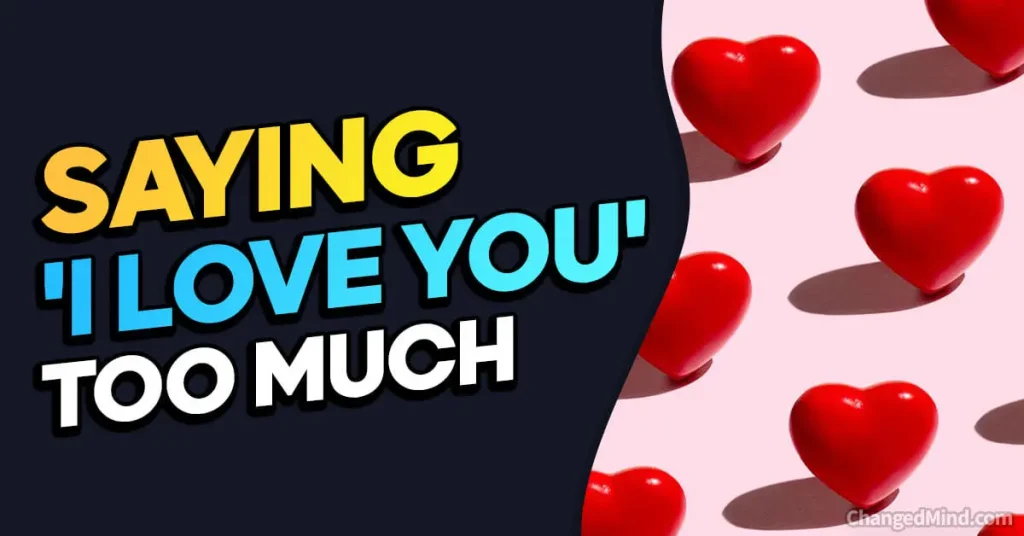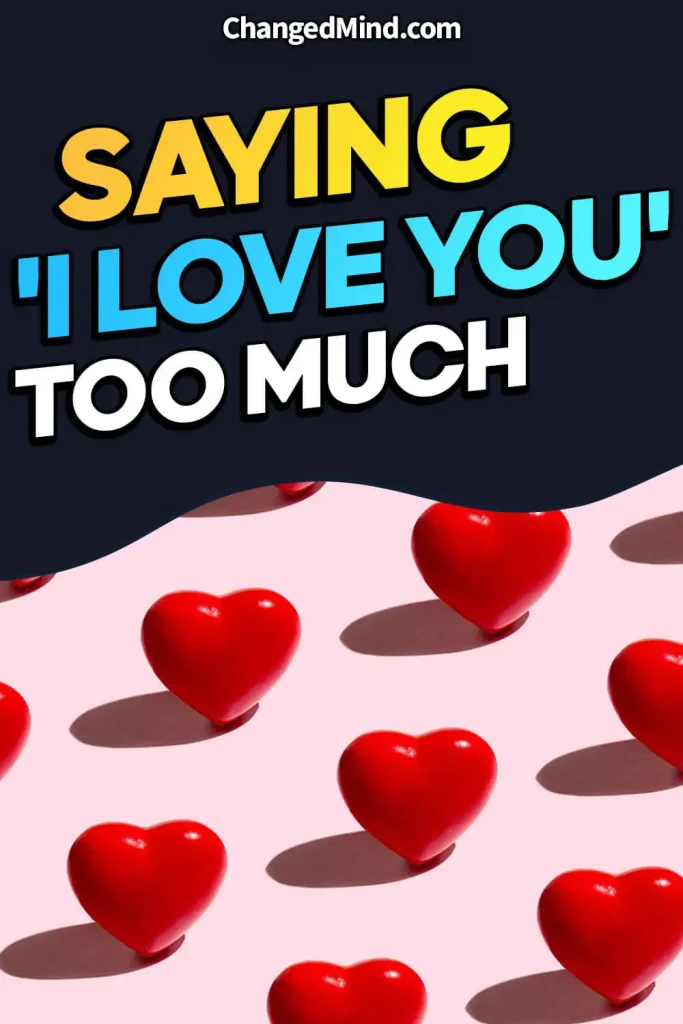Have you ever been caught in the “I love you” loop, where those three little words start to lose their magic?
Brace yourself for a playful journey into the intriguing world of excessive declarations of love.
Discover the surprising impact they can have on your partner and why it’s essential to find the right balance.
Get ready to dive into the Psychology of Saying ‘I Love You’ Too Much!
The Initial Impact of Frequent “I Love You”s
The Beauty of Expressing Love
Let’s start by acknowledging the positive aspects of expressing love and affection. When you’re in a healthy and loving relationship, saying “I love you” is a wonderful way to convey your emotions. It reassures your partner of your deep feelings and strengthens the emotional connection between you both. It’s like a warm hug for the soul.
The Slippery Slope of Excessive Declarations
However, like anything in life, moderation is key. When “I love you” becomes a constant mantra, it can lead to unintended consequences. While you may have the best intentions at heart, overwhelming your partner with excessive declarations of love can create a ripple effect that affects their emotions and self-perception.
The Roller Coaster of Emotions
Picture this: you hear “I love you” from your partner multiple times a day, every single day. At first, it might make you feel cherished and adored. But as time goes on, you might start to wonder if the words are losing their sincerity or if they’re just a reflexive response. Your emotions may go on a roller coaster ride, swinging between moments of joy and moments of doubt.
The Mirror of Self-Perception
Excessive “I love you”s can also have an impact on your self-perception. Your partner’s constant proclamations might lead you to question whether you’re deserving of such intense affection. You might start doubting your own worthiness of love, thinking, “Is this really about me, or is it more about their need to express their own emotions?”
Finding the Balance

So, how do you strike a balance between expressing love and overwhelming your partner with “I love you”s? It all comes down to communication and being mindful of your partner’s needs and comfort levels. Here are a few tips to help you find that sweet spot:
- Quality over Quantity: Instead of focusing on the sheer number of times you say “I love you,” focus on the quality of your interactions and the sincerity behind your words.
- Actions Speak Louder: Remember that actions often speak louder than words. Show your love through gestures, kindness, and support. A surprise date night or a heartfelt note can be just as meaningful as saying the words themselves.
- Check-In Regularly: Have open conversations with your partner about their preferences and comfort levels regarding expressions of love. What makes them feel loved and appreciated? Understanding their perspective can guide you in finding the right balance.
- Embrace Variety: Expand your vocabulary of affection. Instead of relying solely on “I love you,” explore different ways to express your emotions. “You mean the world to me,” “I adore you,” or even a simple “You make me so happy” can add depth and variety to your expressions of love.
Remember, love is a journey of discovery, and finding the right balance in expressing it is an ongoing process. By understanding the potential impact of excessive “I love you”s, you can cultivate a relationship that thrives on authenticity, understanding, and heartfelt connections.
Dependency and Emotional Pressure

The Love Connection: Excessive “I Love You”s and Emotional Dependency
Picture this scenario: you find yourself in a relationship where your partner constantly bombards you with “I love you”s. While it may seem endearing at first, it can inadvertently create a sense of emotional dependency. Let’s dive into why this happens.
The Need for Validation
When your partner repeatedly expresses their love for you, it’s natural to feel a sense of validation and security. However, when “I love you” becomes a constant refrain, it can foster a reliance on those words to validate your self-worth and the strength of the relationship. Your emotions become intertwined with the frequency of their declarations.
The Pressure to Reciprocate
Excessive “I love you”s can also put pressure on you to reciprocate the sentiment, even if you don’t feel the same intensity in that moment. You may find yourself feeling obligated to respond with an equal or greater number of declarations, fearing that a lack of reciprocation might lead to hurt feelings or doubts about your commitment.
Striking a Balance for Autonomy and Boundaries
While love is a beautiful thing, it’s important to maintain a sense of autonomy and personal boundaries within a relationship. Excessive “I love you”s can blur these lines and create a sense of emotional suffocation. Your partner’s constant expressions of love might leave little space for you to explore your own emotions and personal growth.
Embracing Healthy Autonomy
Maintaining a healthy level of autonomy allows you to nurture your own identity and interests outside the relationship. It’s essential to have personal space to foster individual growth and maintain a strong sense of self. Excessive “I love you”s can potentially hinder this process, as they tend to engulf your personal space with constant emotional intensity.
Setting Boundaries and Communicating Needs
Healthy relationships thrive on open communication and respect for each other’s boundaries. If you find yourself feeling overwhelmed by the frequency of “I love you”s, it’s crucial to express your needs to your partner. Let them know that while you appreciate their affection, you also require room to breathe and explore other aspects of your life.
Real-Life Example: The Overzealous Lovebird
Imagine you have a partner who showers you with “I love you”s every few minutes. At first, it might make you feel like the most loved person on the planet. But over time, you start to feel suffocated and unable to express your own emotions freely. You long for moments of silence and personal reflection without the constant barrage of declarations.
Conclusion
Excessive “I love you”s can unintentionally lead to emotional dependency, pressure to reciprocate, and a blurring of personal boundaries. While love and affection are essential in a relationship, finding the right balance is crucial for maintaining individual autonomy and fostering a healthy connection. By openly communicating your needs and embracing a sense of self within the relationship, you can ensure that declarations of love enhance your bond rather than overpower it.
Overfamiliarity and Diminished Meaning

The Danger of Overfamiliarity
In long-term relationships, overfamiliarity is a common phenomenon. It’s like the worn-out pair of sweatpants you wear around the house—they’re comfortable, but they don’t hold the same allure as when they were new. Similarly, excessive “I love you”s can lead to a diminished meaning behind the words.
The Repetitive Love Loop
Think about it: if you hear “I love you” a hundred times a day, it starts to lose its impact. The words become a routine, uttered without much thought or genuine emotion. It’s like eating your favorite dessert every single day; eventually, the taste becomes mundane, and you long for something new and exciting.
The Devaluation of the Phrase
When “I love you” is constantly repeated, it can devalue the phrase and dilute its significance. Those three little words, which once carried immense weight and held deep meaning, may turn into hollow utterances. Your partner might start questioning the authenticity of the words, wondering if they hold any true sentiment or have simply become empty platitudes.
Real-Life Example: The “I Love You” Epidemic
Imagine being in a relationship where “I love you” is exchanged as frequently as “hello” or “goodbye.” At first, it might seem like a dream come true, but as time goes on, the impact of those words gradually diminishes. They lose their power to evoke strong emotions or create a deep connection. Eventually, the phrase becomes background noise, blending into the mundane fabric of daily life.
Reigniting the Spark: Rediscovering the Meaning
While excessive “I love you”s may have caused the phrase to lose its luster, there are ways to reignite the spark and restore its significance in your relationship.
- Quality over Quantity: Instead of mindlessly repeating “I love you,” focus on the quality of your expressions. Choose the right moments to say it, allowing the words to carry genuine emotion and meaning.
- Speak from the Heart: When you do say “I love you,” make it count. Let your partner feel the depth of your affection through your tone, body language, and eye contact. Make each declaration a heartfelt expression of your love.
- Actions and Gestures: Words alone can only do so much. Show your love through meaningful actions and gestures. Surprise your partner with small acts of kindness or thoughtful gifts that demonstrate your affection.
- Discover New Phrases: Expand your vocabulary of love and find alternative ways to express your feelings. A sincere compliment, a heartfelt “thank you,” or a thoughtful appreciation can go a long way in conveying your emotions.
By taking intentional steps to revive the meaning behind “I love you,” you can infuse new life into your expressions of affection and strengthen the emotional bond with your partner. Remember, love is not about the quantity of words spoken but the depth of emotions shared.
Communication Breakdown and Emotional Exhaustion
When “I Love You” Overwhelms Communication
Communication is the lifeblood of any successful relationship. Unfortunately, excessive “I love you”s can unwittingly disrupt the flow of communication between you and your partner. Let’s delve into how this can happen.
The Cluttered Airwaves
Imagine a radio station constantly playing the same song on repeat. It becomes hard to hear anything else amidst the repetitive melody. Similarly, when “I love you” becomes the constant soundtrack of your relationship, it can drown out other meaningful conversations and thoughts. Communication becomes muddled, and important discussions may be overshadowed by an overabundance of affectionate declarations.
Emotional Exhaustion: Love in Overdrive
While love is a wonderful thing, too much of it can lead to emotional exhaustion. Constantly hearing “I love you” can create a state of emotional saturation, where the sentiment loses its impact and drains your emotional reserves. It’s like eating too much candy—you eventually reach a point where you can’t handle any more sweetness.
Real-Life Example: The Love Symphony
Imagine you’re trying to have a serious conversation with your partner about an important issue that needs addressing. However, every time you start to speak, they interject with yet another “I love you.” While their intentions may be good, it disrupts the flow of conversation and prevents the deeper discussion that needs to take place. You may feel frustrated, unheard, and emotionally exhausted.
The Ripple Effect on the Relationship
Excessive “I love you”s can have a profound impact on the overall quality of your relationship. When communication breaks down, unresolved issues may linger, leading to resentment and misunderstandings. Over time, the constant emotional bombardment can erode the connection between you and your partner, hindering the growth and development of your relationship.
Nurturing Healthy Communication
To mitigate the potential negative effects of excessive “I love you”s on communication and the relationship as a whole, consider the following strategies:
- Active Listening: Make a conscious effort to listen actively to your partner, ensuring that their thoughts and concerns are heard and validated.
- Create Space for Dialogue: Set aside dedicated time for meaningful conversations where “I love you” takes a backseat, allowing for open and honest communication.
- Express Love in Actions: While verbal expressions of love are important, remember to show your affection through actions as well. Acts of kindness, support, and thoughtfulness can speak volumes.
- Balance Affectionate Words: Find a balance between expressing your love and fostering open communication. Prioritize the quality of your interactions over the quantity of declarations.
By fostering healthy communication habits and ensuring that “I love you” doesn’t overshadow important discussions, you can maintain a strong emotional connection with your partner while still addressing the deeper aspects of your relationship. Remember, love should be the backdrop to your communication, not the sole focus.
Finding a Healthy Balance
Striking the Right Chord: Tips for Balancing Affection
Now that we understand the potential pitfalls of excessive “I love you”s, it’s time to explore how you can find a healthy balance in expressing affection to your partner. Let’s dive into some practical tips that can help you navigate this delicate dance.
1. Quality Over Quantity
Focus on the quality of your expressions of love rather than the quantity. Instead of mindlessly repeating “I love you” throughout the day, choose the right moments to convey your affection. Make it count by expressing your love with genuine emotion, sincerity, and intention.
2. Open Communication and Understanding
Maintaining open and honest communication is vital in any relationship. Talk to your partner about their needs, preferences, and comfort levels when it comes to expressions of love. Understanding each other’s perspectives and finding common ground can help you strike the right balance that works for both of you.
3. Love in Action
Actions speak louder than words, and this holds true when it comes to expressing love. While verbal declarations are important, consider ways to show your affection through meaningful actions. Surprise your partner with acts of kindness, thoughtful gestures, or engaging in activities they enjoy. These actions demonstrate your love in a tangible and memorable way.
4. Variety is the Spice of Love
Explore different ways to express your love beyond the traditional “I love you.” Expand your vocabulary of affection by finding alternative phrases or endearing nicknames that resonate with your partner. It adds a touch of creativity and variety to your expressions of love, keeping them fresh and meaningful.
Real-Life Example: Love Beyond Words
Imagine surprising your partner with a homemade dinner, complete with their favorite dish and a beautifully set table. As they walk into the room, instead of uttering another “I love you,” you express your affection through the thought and effort put into the meal. Their face lights up with joy, and the love shared in that moment speaks volumes without a single word.
Benefits of a Balanced Approach
Finding a healthy balance in expressing affection brings numerous benefits to your relationship:
- Authenticity: By avoiding excessive declarations, you ensure that your expressions of love are genuine and heartfelt.
- Respecting Boundaries: Balancing affection allows both you and your partner to maintain personal boundaries and nurture individual growth within the relationship.
- Enhanced Communication: Striking the right balance fosters open communication and creates space for deeper conversations, strengthening your emotional connection.
- Memorable Gestures: When you express love through meaningful actions, it creates lasting memories and strengthens the bond between you and your partner.
Remember, finding the right balance is an ongoing process that requires mutual understanding, adaptability, and growth. It’s about discovering what works best for both of you and creating a relationship that thrives on genuine affection, open communication, and meaningful gestures of love.
Conclusion
Congratulations! You’ve made it to the end of our exploration into the psychology of saying “I love you” too much. Let’s recap the key points we’ve covered and leave you with some food for thought.
Striking a Balance for Lasting Love
Throughout this journey, we’ve discovered that while expressing love is important, excessive “I love you”s can have unintended consequences. Here’s what you need to remember:
- The Initial Impact: Excessive declarations of love can lead to emotional dependency, pressure to reciprocate, and a diminished sense of autonomy and personal boundaries.
- Overfamiliarity and Diminished Meaning: When “I love you” becomes repetitive, the phrase loses its impact and can devalue its significance.
- Communication Breakdown and Emotional Exhaustion: Excessive expressions of love can hinder effective communication and lead to emotional exhaustion, impacting the overall quality of the relationship.
Finding Your Balance
To navigate the potential pitfalls of excessive “I love you”s, keep these tips in mind:
- Quality Over Quantity: Focus on the quality of your expressions of love rather than the frequency.
- Open Communication and Understanding: Talk to your partner about their needs and comfort levels when it comes to expressions of love, fostering open dialogue and understanding.
- Love in Action: Show your love through meaningful actions and gestures that speak volumes.
- Variety is Key: Explore alternative ways to express your love beyond the traditional “I love you,” adding creativity and freshness to your expressions of affection.
A Healthy Path Forward
As you reflect on your own expressions of love, remember that balance is key. Nurturing a healthy relationship means finding the sweet spot between heartfelt affection and overwhelming declarations. The goal is to create an environment where love flows naturally, communication thrives, and each expression of love holds genuine meaning.
Embrace the Journey of Love
Love is a beautiful and ever-evolving journey. It requires effort, understanding, and adaptability. By recognizing the potential consequences of saying “I love you” too much, you can cultivate a relationship that flourishes with authentic expressions of affection, open communication, and a deep understanding of each other’s needs.
So, go forth and embark on this adventure of love with newfound awareness. Remember to embrace the power of balanced expressions of love, create meaningful moments, and cherish the connections that truly make your heart sing. Here’s to nurturing healthy relationships filled with love, growth, and everlasting joy!
FAQ
Can saying “I love you” too much be harmful to a relationship?
Yes, excessive declarations of love can lead to emotional dependency, diminished meaning, and communication breakdown, potentially impacting the overall quality of the relationship.
How can I find a balance in expressing affection without overwhelming my partner?
Focus on quality over quantity, engage in open communication, show love through actions, and explore alternative ways to express affection beyond “I love you.”
Will saying “I love you” too frequently diminish the meaning behind the words?
Yes, repetitive expressions can lead to overfamiliarity, causing the phrase to lose its impact and potentially devaluing its significance in the relationship.
What are the potential consequences of devaluing the phrase “I love you”?
Devaluing the phrase can create doubts about the sincerity of the words and hinder effective communication, potentially leading to emotional exhaustion and strained relationships.
Is expressing love through actions more important than saying “I love you”?
While both are valuable, actions can reinforce the sincerity of love. Thoughtful gestures, support, and kindness can speak volumes and add depth to your expressions of affection.
References:
- ResearchGate. (2014). The Role of “I Love You” in Negotiating Love and Desire in Romantic Relationships. Link

Disclaimer
This information is for educational purposes only and is not intended to be a substitute for clinical care. Please consult a health care provider for guidance specific to your case.






